If you enjoy growing or cooking with blueberries, you’ve undoubtedly heard all sorts of folklore, gardening tips and health claims about this tasty fruit. But which are useful, and which do more harm than good? Let’s have a look at 7 common myths about blueberries that you may be surprised to learn aren’t true.
Jump to: Harvesting/Storing | Non-Organic Health Benefits | Blueberries and Cancer | Nutrition of Frozen Blueberries | Myths around Growing Blueberries
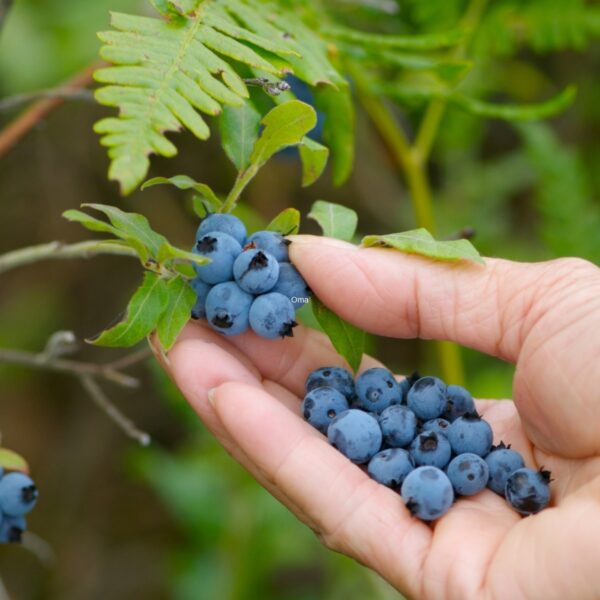
This post may contain affiliate links. As an Amazon Associate, I also earn from qualifying purchases. You can read our disclosure information here–
Blueberry Cooking & Health Myths
Myth #1: Blueberries Will Ripen After Picking Them
Unfortunately, blueberries aren’t like bananas or avocados, which will ripen and soften right on your kitchen counter. Their ripening process stops once they’re removed from the plant.
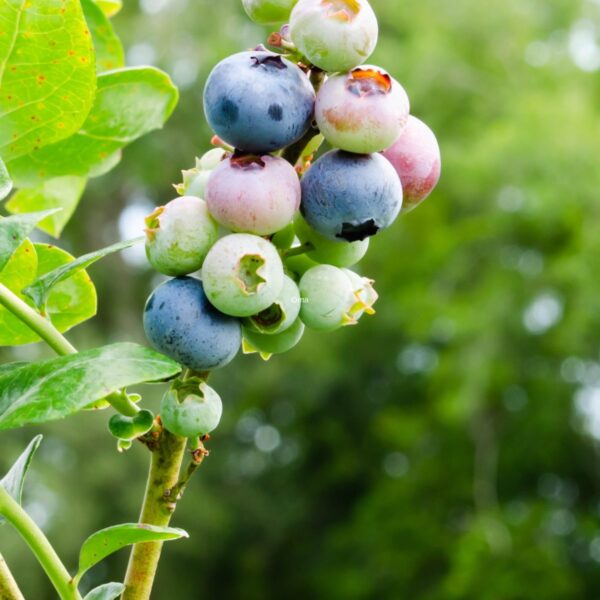
Blueberries picked when still green will never turn blue or lose their tartness. If they’re picked when they’re almost ripe but still have purple shoulders, they don’t fare much better. They may become softer, but they will still be quite sour.
So should you just throw away that container of underripe blueberries you accidentally bought? No! I found a bunch of uses for both green and almost ripe batches, which you can find in the post on 6 ways to save unripe blueberries.
Myth #2. Non-Organic Blueberries Are Healthy
I remember that for a long time, non-organic blueberries were considered fine to buy. Maybe this was due to this berry’s stellar reputation as beneficial to our health. They’re laden with antioxidants and have anti-inflammatory properties, so they can’t be harmful, right?
Unfortunately, blueberries are featured on the Environmental Working Group’s 2023 Dirty Dozen list, and not for the first time. The samples tested by the EWG were absolutely laden with pesticides, sometimes more than 17 different ones. These included pesticides that can affect the human nervous system.
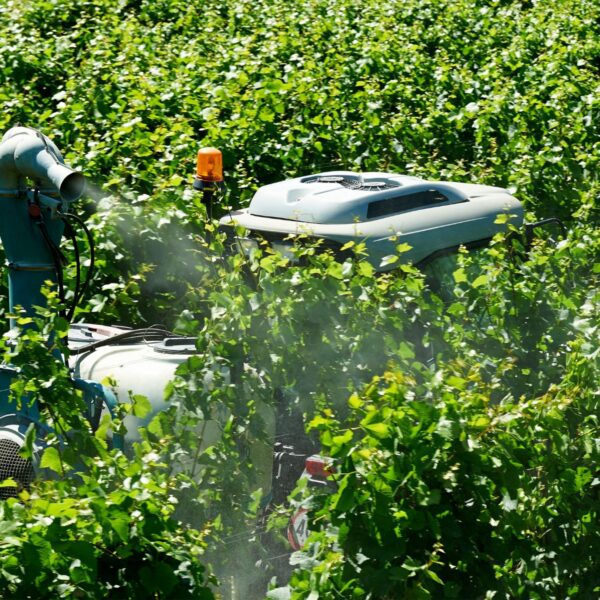
The takeaway? If you are concerned about the health impacts of eating a lot of blueberries, buy organic or grow your own. They are not that hard to grow in pots if you don’t have the garden space.
Myth #3. Blueberries Cure Cancer & Heart Disease
Remember the “superfood” trend that swept the culinary world a few years ago? Goji berries, açaí, kale, and – indeed – blueberries were suddenly marketed as having incredible health-boosting properties.
Now, I’d love to be able to tell you that you can get rid of pesky congenital heart disease by eating a handful of blueberries every day, or prevent cancer from taking hold by snacking on blueberry muffins. The problem is that I can’t: it would be misleading.
I think this myth about blueberries managed to take hold mainly because scientific research is often misrepresented in popular media. A researcher finds that a chemical also found in blueberries can inhibit cancer cell growth in a test tube, and suddenly online sources are raving about this latest “cancer-killing superfood”.
But a test tube is not a human body. Yes, blueberries are very healthy. Yes, they contain many compounds that may help your body fight off disease. They have fantastic potential, but there just isn’t enough conclusive research to be able to state it as fact.
The authors of a 2020 review on fruit’s effect on heart disease summed it up quite well:
“Current evidence is insufficient to show a benefit of blueberry supplements in modifying CVD risk factors across a variety of adult populations. Robust data and larger studies are required to assess potential effects.”Blueberry and cardiovascular disease risk factors: A systematic review and meta-analysis of randomized controlled trials
Myth #4: Frozen Blueberries are not as Nutritious as Fresh
This myth has been proven to be untrue for quite a while. Way back in 1998, the Food & Drug Administration confirmed that frozen fruits and vegetables provide the same essential nutrients and health benefits as fresh – great news for those seeking year-round healthy foods.
Additionally, if you purchase frozen blueberries, they are simply the pure, one-ingredient fruit. No syrups or additives (unless the label says otherwise)
If you freeze your own, you’re in luck. Blueberries are probably the easiest fruit to freeze and maintain their quality. Just lay them out on a sheet pan, freeze them, and then consolidate into a freezer bag once frozen. Perfect for your morning smoothie!
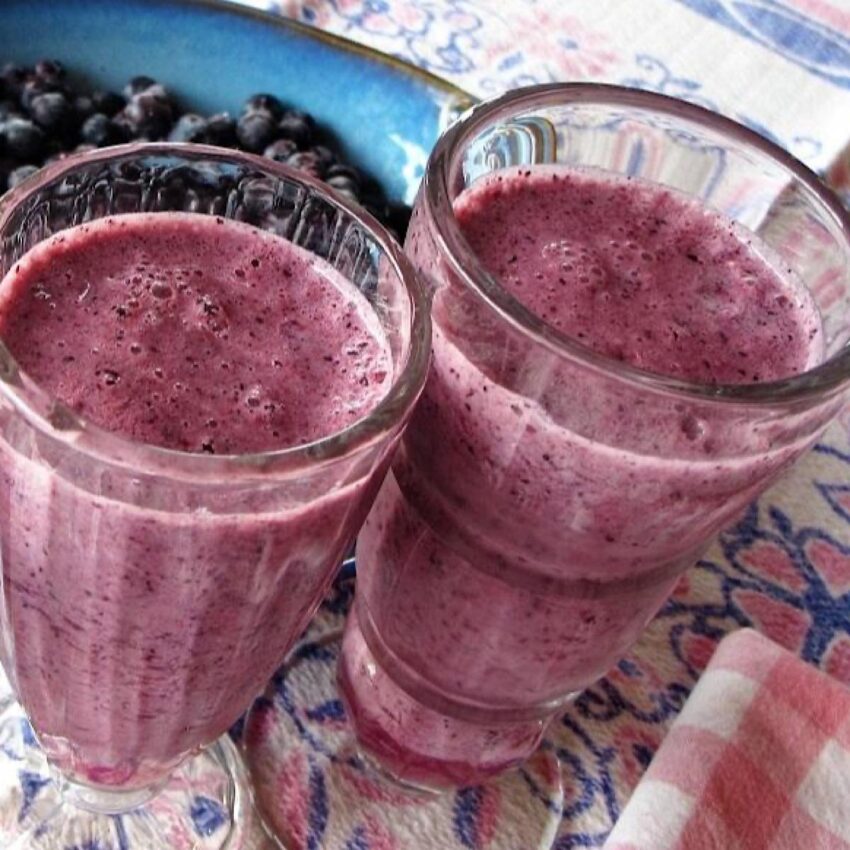
Myths Around Growing Blueberries
Myth #1. Coffee Grounds Acidify Soil
One of the most common pieces of gardening advice, which you’ll come across in almanacs, plant care guides and Facebook gardening groups, is that you can use spent coffee grounds to make your garden soil more acidic.
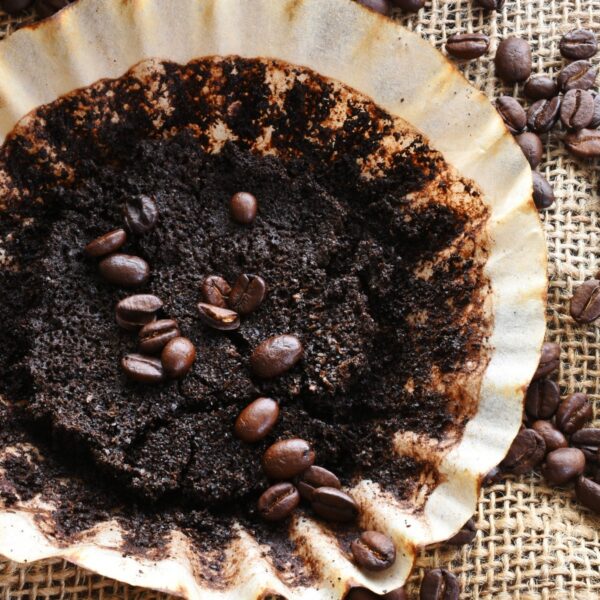
Given that blueberry plants appreciate a lower soil pH, reusing coffee grounds you would otherwise have thrown away can sound like an attractive option. But does it actually work?
Unfortunately, no. While research has shown that coffee grounds can come in handy for some types of agriculture, they won’t do much to acifidy soil for blueberries. Their pH actually tends to be neutral, not acidic.
And don’t forget that there are also studies that found coffee grounds to reduce plant growth. As such, as nice as the idea is, you shouldn’t just go ahead and toss them in your garden! Instead, you can use peat moss or a commercial soil acidifying fertilizer.
Myth #2. Blueberry Bushes Don’t Need Full Sun
Because wild blueberries can be found in shaded forests, some gardeners believe they need similar conditions in our backyards. This has led to one of the more persistent myths about blueberries: the belief that they like shade.
Now, it’s true that wild (lowbush) blueberries are forest plants.
However, although wild blueberry plants don’t need as much sun as their cultivated (highbush) cousins, they actually do still appreciate plenty of light. They’ll produce better if they can soak up plenty of it.
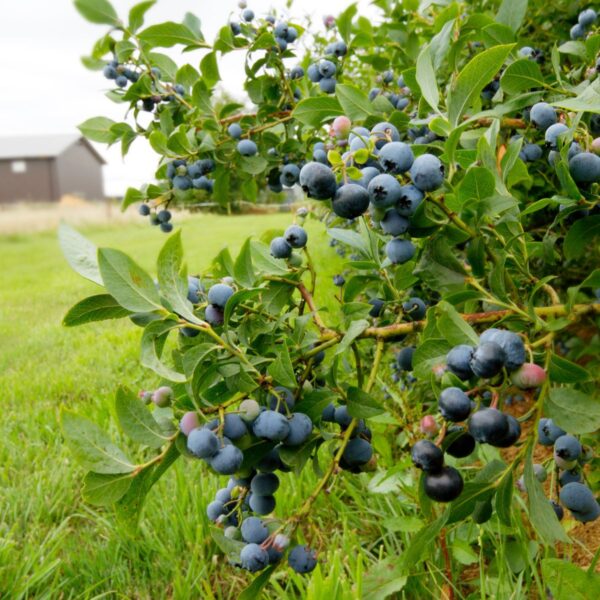
As for highbushes, I definitely recommend giving those as much sun as possible. If they’re surrounded by trees and don’t get their full 6-8 hours of light, your shrubs just won’t yield as much fruit.
Myth #3. You Only Need One Blueberry Variety
If you’re a casual blueberry grower who’s just happy to be able to pick a few berries at some point this summer, there’s no need to diversify your blueberry bushes. But you may still want to: growing multiple blueberry varieties is the best way to be able to enjoy a good harvest from late spring all the way to early fall.
Blueberry plants really thrive when they are paired with one or two different varieties. The bees cross pollinate them, and they end up giving you a much more prolific harvest.
In addition, as I discuss in more detail in the post on how to tell when blueberries are ripe, not all varieties are ready for harvest at the same time. There are early (May-June), mid-season (July-August) and late (all the way into September) blueberries. Adding different varieties can increase the blueberry season from 5 weeks to 8 weeks.
If you get at least one of each of these varieties, your blueberry yield will increase dramatically. If you get at least two of each, the pollination rate will also improve, giving you an even bigger harvest!
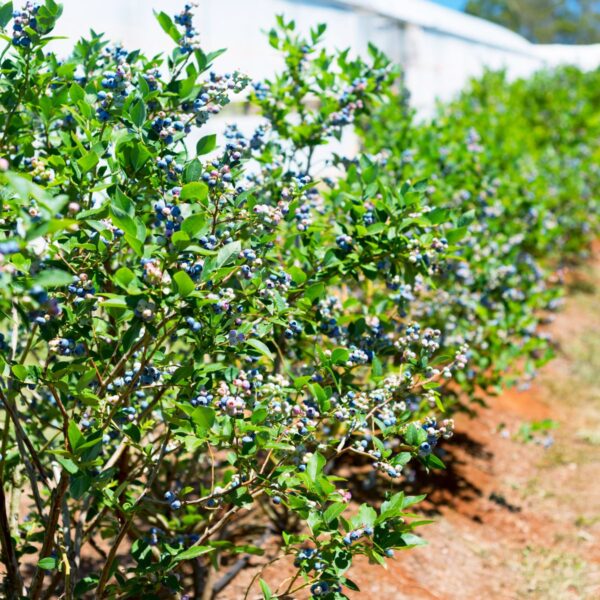
Myth #4. Blueberries Like Wet Soil
Because blueberry shrubs naturally grow in bogs and damp forests, some gardeners believe that their soil should be kept moist or even wet.
Now, research has shown time and time again that blueberries do indeed love moisture, but they really love well-drained soil rather than a clay soil that will keep their roots wet for too long.
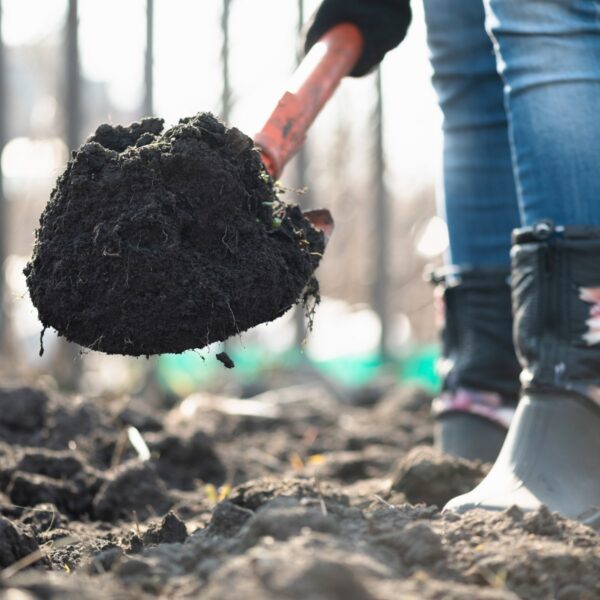
If you’re growing the shrub in a container rather than in full soil, stick your finger in the soil and water when the soil is dry down to one inch.
Overwatering from time to time won’t kill your plant, but consistently wet soil can eventually lead to root rot.
You can give your blueberry bush 1-2″ of water weekly during the active summer growing months. This should keep the soil lightly moist (but again, not sopping wet). In winter, when the plant is mostly dormant, you only have to check on the plant every other week or so.
**Tip: Blueberries like rain water better than other sources of water, as it tends to be more acidic.
Myth #5. Blueberries Are Hard To Grow
For some reason, one of the most persistent myths about blueberries is that they’re challenging to grow. This is primarily due to the idea of having and maintaining an acidic soil.
You may have trouble keeping your blueberry shrubs alive or getting them to produce well if your soil isn’t acidic enough, but if you take care to test your soil ahead of planting and then make any necessary amendments, blueberries are very easy to grow and they can last for decades.
I grow 600 plants at our farm and each one was planted in a 3-foot wide hole with 1/3 peat, 1/3 compost and 1/3 my sandy soil. They were planted in 1998 and are still thriving 25 years later.

Occasionally I will scratch in pelleted sulphur around the hole in the Fall to replenish the acid. I mulch them with wood chips to keep the weeds down but the elemental sulphur is the acidifier, not the wood chips.
They do not have a lot of insect pests or disease to contend with. You do have to prevent birds from eating the berries and deer from eating the young stems however. Those were the biggest problems for me in getting a good yield. Neither one will kill the plant, but you may only get a handful of berries unless you protect from birds and deer.
If you’re still nervous about trying your hand at growing blueberries, check out some of my growing guides for yourself to see how easy it is. Learn how to grow blueberries in pots or find an answer to your specific question in the Growing Blueberries category.
If you like my articles about cooking and gardening, subscribe to my weekly newsletter, where I share free recipes and gardening tutorials.

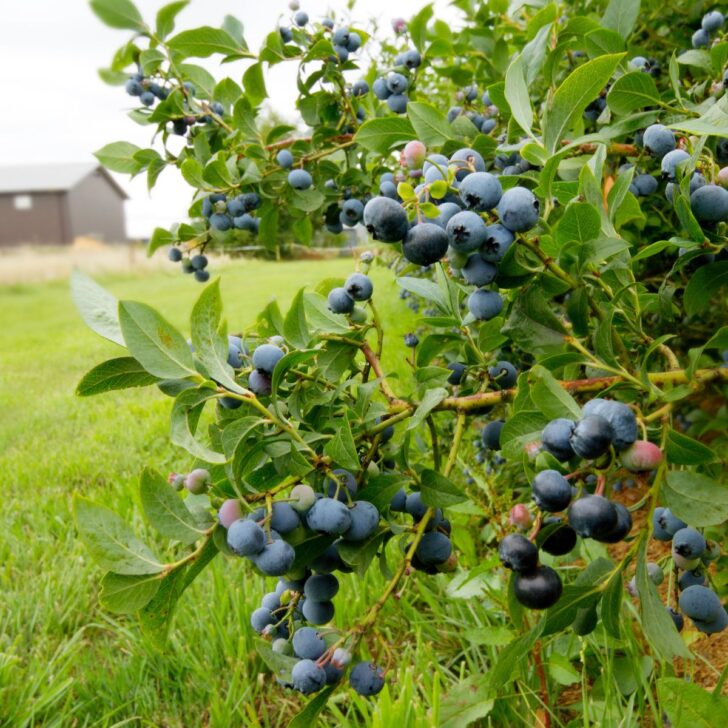
Leave a comment